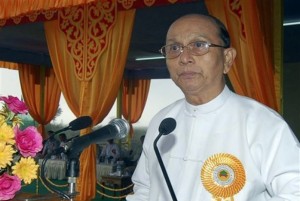Burma’s President U Thein Sein arrived in Washington on Saturday and met with United States President Barack Obama today (Thai time) amidst criticism’s from international human rights groups that the Burmese’s government has failed to carry out its reforms promises made late last year.
 John Sifton, Asia advocacy director at the New York based Human Rights Watch said in a media statement that a large number of Burma’s political prisoners have not been released and in the last year there has been “devastating violence against minorities and a stalled reform process.”
John Sifton, Asia advocacy director at the New York based Human Rights Watch said in a media statement that a large number of Burma’s political prisoners have not been released and in the last year there has been “devastating violence against minorities and a stalled reform process.”
Mr Sifton said the United States President, Barack Obama, “should insist on steps to prevent further outbreaks of violence. He must also make it clear that there are consequences if the Burmese government fails to implement its previous human rights pledges.”
Human Rights Watch explained that President Thein Sein issued a set of pledges last year on “key reform issues” that he has failed to implement.
The President Sein Thein’s pledges included, “promises to create a commission to review political prisoner cases, invite the United Nations High Commissioner for Human Rights to open offices in Burma, and “expedite its negotiations” with humanitarian organizations for access to conflict-affected areas.”
The Human Rights Watch media release detailed President Thein Sein’s the pledges that he made in 2012 where he promised that his government would take “decisive action to prevent violent attacks against civilians,” hold perpetrators of abuses accountable, and “address contentious political dimensions, ranging from resettlement of displaced populations to granting of citizenship.”
Human Rights Watch points out that, “six months later, the Burmese government’s implementation of most of these pledges has faltered. No invitation has been issued to the United Nations High Commissioner for Human Rights, and negotiations for an agreement to set up an office have made no significant progress. Humanitarian aid organizations remain without full access to conflict areas in Kachin State, where a nearly two-year armed conflict between the Burmese army and Kachin rebels has displaced over 80,000 people, and in eastern Burma, where over 400,000 people are displaced from decades of civil war.”
The Burma Campaign UK accused President Thein Sein of using the release of political prisoner for public relations stunts. Wai Hnin, Campaigns Officer at Burma Campaign UK said.
“The release of any political prisoner is welcome, but two years after the reform process began, people should be asking why there are still hundreds of political prisoners still in jail,” said. These releases are blatantly designed to get good publicity ahead of Thein Sein’s visit to the USA. It is disgraceful to use political prisoners for public relations like this.”
The Burma Campaign UK claim that while President Thein Sein may have released hundreds of political prisoners, “hundreds more have been arrested in Kachin State and in Rakhine State.”
Burma Campaign UK said in its media statement that President Thein Sein has also failed to remove repressive laws used to intimidate and to jail political opponents.
“Almost all the releases of political prisoners have only been released conditionally, meaning that if they engage in political activities which the government does not like they can be put back in jail and have to serve a new prison term and their old prison term.”



